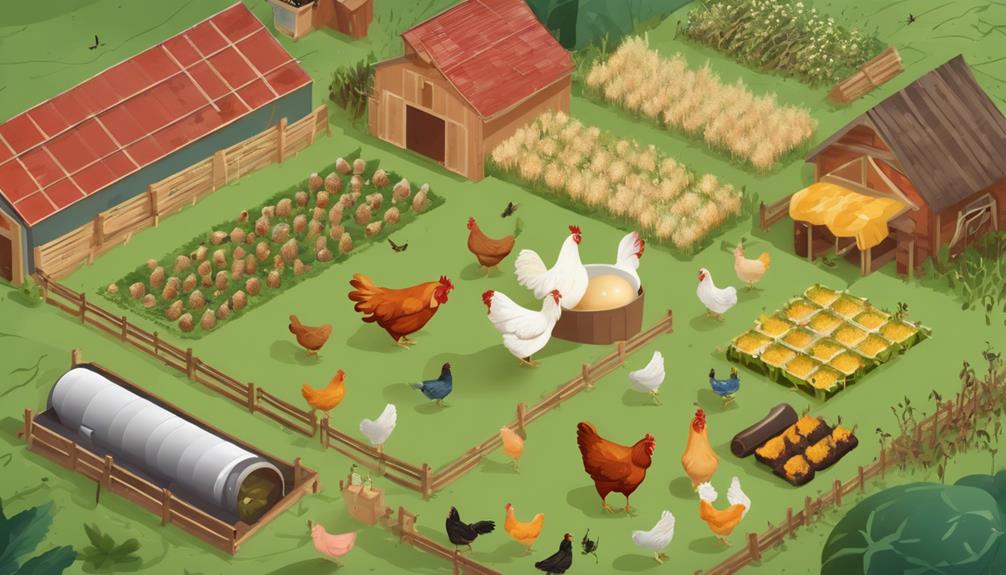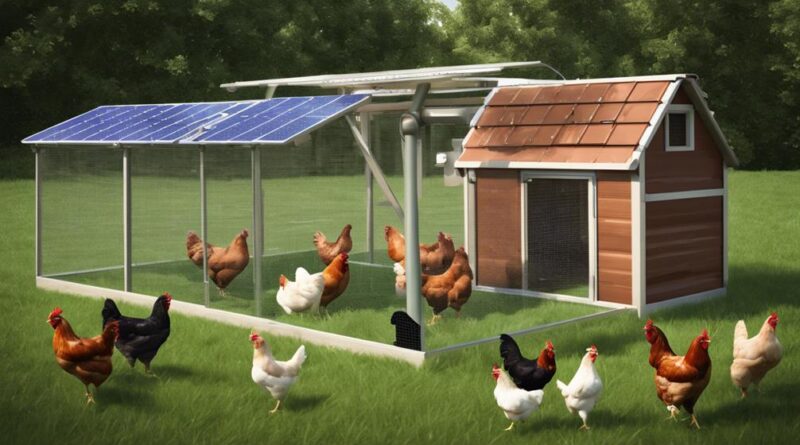7 Best Eco-Friendly Methods in Chicken Egg Production"
When it comes to chicken egg production, implementing eco-friendly methods is not only beneficial for the environment but also for your overall sustainability goals. By focusing on sustainable feed choices, pasture-raised practices, and natural pest control methods, you can significantly reduce your ecological impact. But that's not all; there are even more effective strategies that can enhance your eco-friendly approach to chicken egg production. Curious to find out what they are? Stay tuned to discover the 7 best eco-friendly methods that can revolutionize your chicken egg production process.
Sustainable Feed Choices
When aiming to implement sustainable practices in chicken egg production, selecting feed options that prioritize environmental impact and nutritional quality plays a crucial role. Opting for organic grain feed can significantly reduce the ecological footprint of egg production. Organic grains are cultivated without synthetic pesticides or fertilizers, promoting soil health and biodiversity. Additionally, these grains are non-GMO, ensuring the chickens aren't consuming genetically modified organisms that can have unknown long-term effects.
Choosing locally sourced feed is another key aspect of sustainable egg production. By sourcing feed locally, you support nearby farmers, reduce transportation emissions, and ensure fresher ingredients for the chickens. Locally sourced feed also helps to strengthen the local economy and promotes a more transparent supply chain. When feed is produced nearby, it's easier to verify the quality and sustainability of the ingredients used.
Incorporating both organic grain and locally sourced feed into your chicken egg production can lead to a more environmentally friendly and nutritionally superior product. By being mindful of the feed you provide your chickens, you contribute to a more sustainable food system while also ensuring that the eggs produced are of high quality and nutritional value.
Pasture-Raised Chickens
To further enhance the sustainability of your chicken egg production practices, consider implementing a pasture-raised approach for your chickens. Pasture-raised chickens are allowed to roam freely outdoors, foraging on grass, insects, and other natural vegetation. This method not only benefits the chickens' welfare but also has positive implications for the environment and the quality of the eggs produced.
When raising pasture-raised chickens, opting for organic certification can add value to your operation. Organic certification ensures that the chickens are fed organic feed, free from synthetic pesticides, herbicides, and genetically modified organisms. Additionally, organic certification guarantees that the land on which the chickens are raised is free from chemical inputs, promoting biodiversity and sustainability.
Local sourcing is another crucial aspect to consider when implementing a pasture-raised system. By sourcing feed and other resources locally, you reduce the carbon footprint associated with transportation and support local farmers and businesses. This not only strengthens the local economy but also fosters a sense of community and reduces the environmental impact of your egg production operation.
Natural Pest Control Methods
Implementing natural pest control methods is essential for maintaining a healthy and sustainable environment in chicken egg production. One effective approach is biological control, which involves using natural predators or parasites to manage pest populations. For instance, introducing beneficial insects like ladybugs or parasitic wasps can help control common pests like mites or flies in chicken coops. These natural predators can significantly reduce the need for chemical pesticides, thus minimizing environmental impact and promoting a more organic production system.
Integrated pest management (IPM) is another key strategy that combines various pest control techniques to prevent infestations. This method focuses on monitoring pest levels, implementing preventive measures, and utilizing biological controls before resorting to chemicals. By integrating practices such as regular pest monitoring, maintaining proper sanitation, and introducing natural enemies of pests, farmers can effectively manage pest populations while reducing reliance on synthetic pesticides.
Incorporating these natural pest control methods not only benefits the environment but also enhances the overall health and well-being of the chickens. By reducing exposure to harmful chemicals, promoting a more balanced ecosystem, and improving air and water quality, biological control and integrated pest management play a vital role in sustainable chicken egg production. As such, adopting these eco-friendly practices is crucial for ensuring the long-term viability of egg production systems.
Renewable Energy Sources
To further enhance sustainability in chicken egg production, exploring the integration of renewable energy sources presents a promising avenue for reducing environmental impact and promoting long-term resilience. Solar power and wind turbines are two key renewable energy sources that can be effectively utilized in chicken egg production facilities.
Solar power offers a clean and sustainable energy solution for powering various operations on a chicken egg farm. By installing solar panels, farms can harness the abundant sunlight to generate electricity for lighting, heating, cooling, and other energy-intensive processes. This not only reduces reliance on fossil fuels but also lowers operational costs over the long run. Additionally, excess solar energy can be stored in batteries for use during periods of low sunlight, ensuring a continuous power supply.
Wind turbines are another renewable energy option that can complement solar power in chicken egg production. Farms situated in areas with consistent wind patterns can benefit from installing wind turbines to generate electricity. The rotational energy produced by the spinning blades can be converted into electrical power, further reducing the carbon footprint of the farm. Wind turbines are particularly advantageous in rural areas where land is available for setting up these structures.
Composting Chicken Waste
Composting chicken waste plays a vital role in sustainable agricultural practices by effectively managing organic materials and reducing environmental pollution. When done correctly, composting not only helps in waste reduction but also provides numerous benefits for soil enrichment, nutrient recycling, organic fertilization, and garden sustainability.
Here are four key reasons why composting chicken waste is essential:
- Soil Enrichment: Chicken waste is rich in nitrogen, phosphorus, and potassium, which are essential nutrients for soil health. Composting allows these nutrients to be broken down and released slowly into the soil, improving its fertility and structure.
- Nutrient Recycling: Instead of allowing valuable nutrients to go to waste, composting chicken waste enables the recycling of these nutrients back into the soil. This closed-loop system reduces the need for synthetic fertilizers and promotes a more sustainable agricultural model.
- Organic Fertilization: The compost produced from chicken waste is a natural and organic fertilizer that nourishes plants without the use of harmful chemicals. This leads to healthier crops, increased yields, and improved overall garden sustainability.
- Garden Sustainability: By composting chicken waste, you contribute to the long-term health and productivity of your garden. The organic matter in the compost improves soil structure, retains moisture, and supports beneficial microbial activity, creating a thriving environment for plants to grow.
Water Conservation Strategies
Effective water conservation strategies play a pivotal role in maintaining sustainable practices within chicken egg production systems. By implementing drip irrigation systems, water can be efficiently delivered directly to the roots of plants, reducing water wastage significantly. Drip irrigation not only conserves water by minimizing evaporation but also helps in controlling the moisture levels in the soil, promoting healthier plant growth.
Greywater recycling is another essential strategy that can be employed to conserve water in chicken egg production. Greywater, which includes wastewater from processes like egg washing, can be treated and reused for activities such as cleaning coops or watering plants. This recycling not only reduces the demand for fresh water but also minimizes the amount of wastewater that needs to be treated and disposed of, thus decreasing the environmental impact of chicken egg production.
Research indicates that by incorporating drip irrigation and greywater recycling practices, chicken egg producers can reduce their water consumption by up to 50%. These conservation strategies not only benefit the environment by preserving water resources but also contribute to cost savings for producers in the long run. By adopting these eco-friendly methods, chicken egg production can become more sustainable and environmentally friendly, aligning with the growing consumer demand for responsibly produced food.
Biodiversity Promotion

Implementing biodiversity promotion techniques enhances the ecosystem resilience and productivity within chicken egg production systems. By focusing on habitat restoration and native species reintroduction, you can create a more sustainable environment for both the chickens and surrounding wildlife.
Here are four key strategies to promote biodiversity in chicken egg production:
- Habitat Restoration: Restoring natural habitats within and around chicken farms can provide nesting areas and food sources for various species. This restoration helps create a more balanced ecosystem where different organisms can thrive.
- Native Species Reintroduction: Introducing native species back into the environment can help rebuild populations that may have been displaced due to human activities. This reintroduction contributes to the overall biodiversity of the area.
- Ecosystem Balance: Maintaining a diverse range of plants, insects, and animals within the ecosystem ensures that each species plays its unique role in supporting the overall balance. This balance is essential for a healthy and sustainable environment.
- Wildlife Corridors: Establishing wildlife corridors allows for the safe movement of animals between different habitats. These corridors help prevent isolation of populations and promote genetic diversity among species.
Frequently Asked Questions
How Can Chicken Egg Production Contribute to Reducing Food Waste?
To reduce food waste, you can improve efficiency in chicken egg production by implementing better storage methods, reducing spoilage. Proper temperature control and timely collection of eggs can prevent them from spoiling.
Utilizing technology like data analytics can help track production patterns and optimize processes. By focusing on minimizing waste at every stage, from collection to distribution, you can contribute to a more sustainable and eco-friendly approach in chicken egg production.
Are There Any Benefits to Biodiversity From Chicken Egg Production?
When it comes to the benefits of biodiversity from chicken egg production, habitat restoration plays a crucial role. By implementing sustainable practices, you can contribute to creating habitats that support various species, thus increasing species diversity.
This can result in a healthier ecosystem overall. So, by focusing on habitat restoration and promoting species diversity through your chicken egg production methods, you're actively supporting biodiversity and its positive impacts on the environment.
What Are the Implications of Water Conservation on Egg Quality?
To improve egg quality through water efficiency, consider optimizing nutrient retention. By focusing on water conservation methods, you can enhance the overall health of the chickens, leading to better quality eggs.
Implementing strategies like efficient watering systems and proper waste management can positively impact egg production. Prioritizing water conservation not only benefits the environment but also plays a crucial role in maintaining high-quality eggs.
How Do Renewable Energy Sources Impact the Taste of Eggs?
When you consider renewable energy sources in chicken egg production, you might wonder how they impact the taste. Studies show that using renewable energy can positively influence the flavor profile of eggs. This is because sustainable practices often lead to healthier and happier chickens, resulting in better-tasting eggs.
Renewable energy sources like solar or wind power can help create a more eco-friendly environment that enhances the overall quality and taste of the eggs you enjoy.
Can Composting Chicken Waste Attract Unwanted Pests?
When composting chicken waste, pest management becomes crucial to avoid attracting unwanted insects or rodents. To reduce the risk of pests, proper waste reduction techniques must be implemented.
Regularly turning the compost pile and maintaining the right balance of carbon and nitrogen can help control pests. Additionally, covering the compost pile with a breathable material can deter pests while still allowing for proper decomposition of the chicken manure.
Conclusion
In conclusion, adopting eco-friendly methods in chicken egg production is essential for sustainability and environmental preservation.
By implementing sustainable feed choices, pasture-raised practices, natural pest control methods, renewable energy sources, composting chicken waste, water conservation strategies, and biodiversity promotion, producers can reduce their ecological footprint, support local farmers, and contribute to a healthier environment.
These practices not only benefit the planet but also lead to cost savings and long-term success in the chicken egg production industry.
